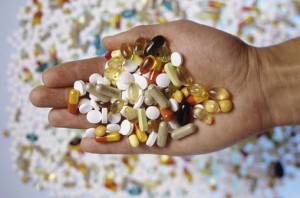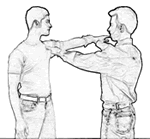 Supplements are essential to health, aren’t they? We hear this message on television and you get all kinds of health “advice” in just about any magazine you read. Supplements are the cornerstone of the great alternative movement. There is a lot of information and if you try to keep up with what supplement to use for what ailment, you must put a lot of time into it. Perhaps you have noticed that the information you get in one place often conflicts with information attained at other sources?
Supplements are essential to health, aren’t they? We hear this message on television and you get all kinds of health “advice” in just about any magazine you read. Supplements are the cornerstone of the great alternative movement. There is a lot of information and if you try to keep up with what supplement to use for what ailment, you must put a lot of time into it. Perhaps you have noticed that the information you get in one place often conflicts with information attained at other sources?
Why? In part, the information is theory, which means it hasn’t really been proven, but the large majority of people teaching about supplements are simply trying to sell you their line of products. As a seller, if you make your product sound like it can be helpful with some of the most common symptoms, then everyone will feel it will be of some benefit to them. It’s really quite simple, and effective marketing, I might add. This scheme has worked so well over the last decade that supplement companies made more money than the pharmaceutical companies! In response, the pharmaceutical companies tried to make over-the-counter supplement sales illegal. But they have not won that battle yet. “If you can’t beat them, join them.” Yes, now the pharmaceutical companies started manufacturing their own brand of supplements to get their share of the profits.
The Source of Your Supplement
There are several things to consider here. First of all, not all supplements are created equal. After years of practice and testing people, I would say that most of the supplements available are actually harmful to the body! There are many reasons, including the source of the nutrients used to make the supplement (often extracted from crude oil, rusted metals, feces and other things I won’t mention). There is also the issue of quality control and excessive heat (which deactivates the nutrients). There are too many unforeseeable reasons, you just can’t take any report for face value. All too often, the best case scenario is that when you take a supplement, you are eating money. But there are many times when that supplement may not be good for you.
Is Your Supplement Robbing You of Other Nutrients?
When you ingest a nutrient, either because you acquire it from the food you eat or from the supplement you take, each nutrient must combine with other nutrients to accomplish its many tasks. This is called the “intrinsic factor” of each nutrient. Most nutrients can do nothing individually. When you take them, they require other nutrients to accomplish all their tasks. If you give a master craftsman only some of the tools required to make a masterpiece, you will never see a finished product. Luckily the body has reserves of most elements, or that is what the body is supposed to have if our diet is fairly healthy. So I don’t get overly concerned if I want to take some Vitamin C for a short time. But if you take a single nutrient for a long time, you are asking the body to continually herald the other intrinsic factors and they will become more and more depleted. You might think that if you take a multi supplement it solves the problem, but our tests show most multi vitamins are not a good choice!
Herbs Are Nature’s Created Supplements
Luckily, Nature had this all figured out. The intended way to get all your essential nutrition was in a diet filled with plenty of foods grown in fertile soil. Since that is no longer an option for most, we must supplement with herbs. Not a good multi-vitamin, not One-A-Day or any of those brands I probably should not mention…herbs. Herbs are simply various plants of the field, so they should be considered foods more than medicine. Instead of going to your local vitamin shop, find an herb that is supposed to contain that nutrient you seek. Every plant has all intrinsic factors already in it, so if you take an herb high in Magnesium (like Red Raspberry), you will automatically get all the Magnesium and the intrinsic factors the body will need so none of the body’s reserves get depleted. Pretty genius Creator, huh?
Using Kinesiology To Find The Right Supplement
For those of you doing kinesiology, keep in mind that you should test every supplement you take. Just because it is natural, or even an herb does not mean it is good for you. Good for you should initiate a high strong response, which means it should test well with kinesiology. If something does not test good with kinesiology, it is going to cost the body more energy than it will supply, even if that product is giving you some form of symptom relief. Just because a “natural” supplement works to relieve a symptom does not mean it is good for the body on an energy level. Only a good, unbiased kinesiological response can tell you if a supplement is good. Remember that results are not the final test, a pain pill gives you that, but it isn’t good for you.
The Electrical Part of Supplements
Our research has found that the body is not always deficient in nutrients as much as the body is unable to assimilate nutrients. Each nutrient consists of two parts: a physical molecule and a micro current that makes that molecule effective in the body. Molecules without current are about as effective as a light bulb without electricity. The bulb is there, but it is not going to work without current. Cooking and processing destroy the currents in food (and nutritional formulas), reducing or totally destroying the nutritional value.
Most foods and supplements available in today’s market consist of molecules without current. Foods are picked green, agriculture is sprayed with chemicals and fertilizers, enzyme blockers are placed in foods so they won’t rot so quickly (which is bad since enzymes are what make the electric current) and finally the manufacturing process destroys what good might have been left. This makes the majority of today’s food and supplements of little or no value to the body. That current, or lack of it, is what will make a product test good or bad in kinesiology.
